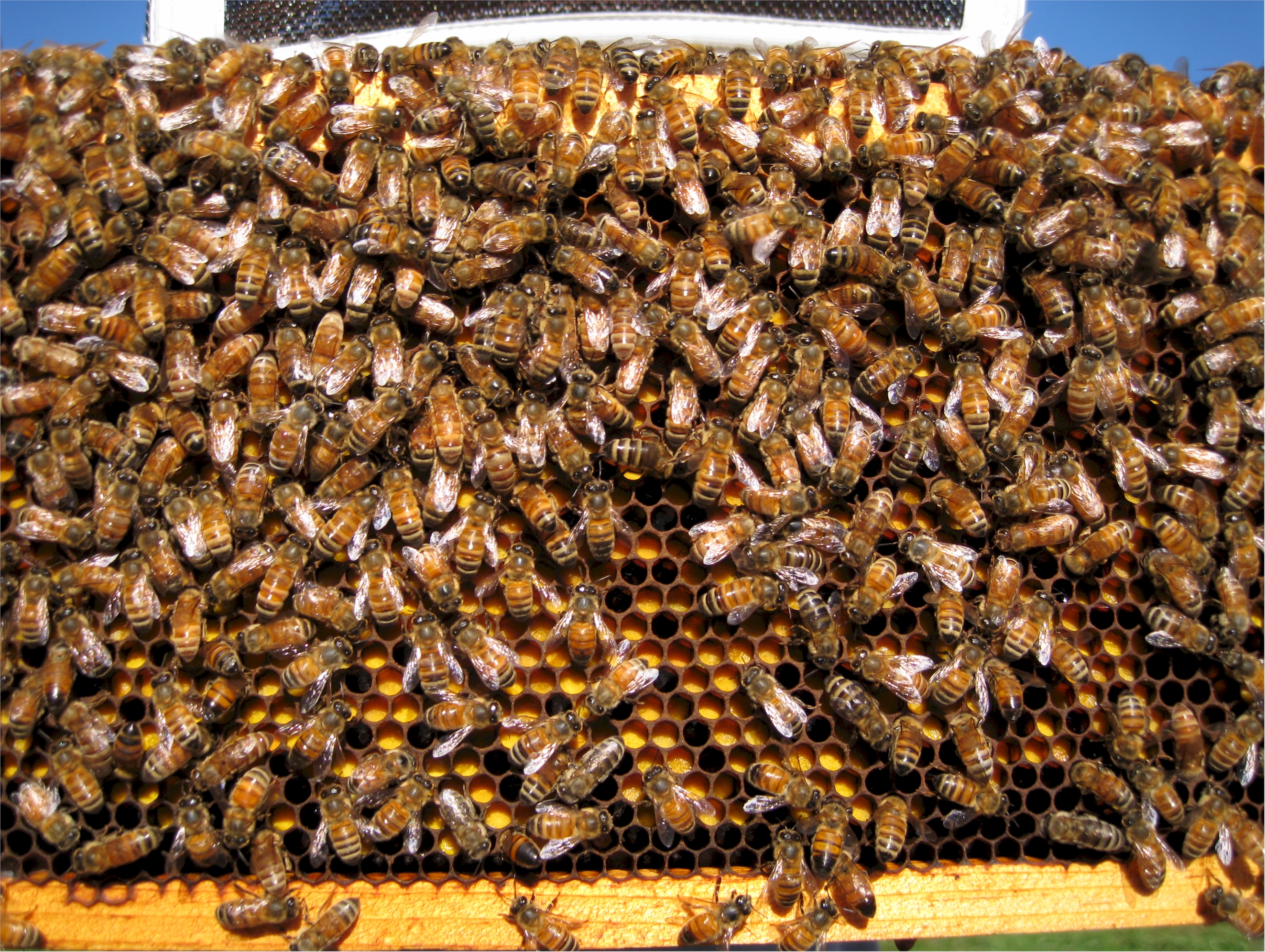Jody Moore is a NC Master Beekeeper and owner of Rocky River Bee Farm which operates 30-40 hives out of six Chatham County locations (www.rockyriverbees.com)
What is the process of honey making?
There are two parts when it comes to “making honey”: nature & humans. The bees and nature make it and humans extract it for our use. When flowers bloom they produce nectar, which is a sweet liquid that attracts bees. When the bees collect nectar, they also end up collecting pollen on their bodies, which they spread to different flowers as they visit them. This is why plants produce nectar- it provides them a way to attract bees so they can fertilize each other and reproduce. They have a symbiotic relationship. Honey bees collect nectar into their “honey crop”, which is like a sack before their stomach, in which they can transport liquid. While in the honey crop, enzymes are added to the nectar. Then they transport it back to the hive where they “hand it off” to a worker bee, who takes it into the hive and places it in a cell with other nectar, adding their own enzymes along the way. The cells are made of beeswax, which they build out as needed.
…
Frames of capped honey are removed from the hive and taken away. Honey can be extracted by cutting the caps off and spun out in a centrifuge. This is for extracting larger amounts and working with many frames at a time, or it can be as simple as squeezing the honey comb into a filter and letting gravity do the work. This works fine for smaller amounts. Honey is then filtered to remove any bits of wax or bee legs and such that might have made their way into the process. At this point, it is ready to be bottled. Over time, honey can crystallize. It never spoils though, so a jar of crystallized honey can be placed in warm water and it will re-liquify.
How does the use of pesticides affect the quality of honey?
There hasn’t really been an issue with pesticides affecting honey itself, but instead they affect the honey bee population. The worst pesticides for bees are ones that are applied when a plant is blooming- especially those in dust form. Bees will often take trace amounts back to the hive, mixed in with pollen, where it is fed to the developing larvae. This is basically poisoning the generation that is developing at that time. Considering that honey bees are constantly replacing their numbers, this can cause a colony to collapse.
If you must use pesticides in your yard and garden, the best practice would be to avoid applying these while the plant is blooming. Liquids are better than powders and dusts. And application late in the afternoon is the best time, since most bees have returned to the hive by later in the day.
Why should people buy local honey?
Many of the benefits of local honey come from the fact that it is made from plants that are naturally blooming in your area. Small amounts of pollen from local plants are suspended in honey, which gives a small dose of pollen to the eater. Some people consume local honey every day to strengthen immunity and reduce pollen allergy symptoms. Raw local honey has not been heated, either. Heat destroys many of the beneficial enzymes that are living in raw honey. These enzymes have many positive effects on digestion and provide probiotic compounds as well as certain beneficial antioxidant and antimicrobial properties which are not present in table sugar.
…
Much of the honey in the grocery store is not from this country. Some of the honey from China has been tested and they have simply fed their bees sugar water or corn syrup – so it is not really honey at all. Different countries have different rules pertaining to honey labeling, and not all are as strict as US regulations. In addition, most of the grocery store honey has been heated and filtered so finely that all of the pollen and beneficial enzymes have been removed or destroyed.
Finally, buying local honey supports local beekeepers. This not only boosts the local economy, but it keeps beehives working in your area. Pollination by honey bees boosts plant productivity- from backyard gardens to fruit trees- so many people benefit, even if they don’t have a hive. Honey bees can fly up to 5 miles in search of food, so there is a large area that benefits from each and every hive.
Do you have any recipes with honey that people should try?
Honey is nature’s original “sweet” and a healthy replacement for sugar in so many ways. It can be used to sweeten iced tea, used like syrup on pancakes, used like sugar on oatmeal or cereal, or used in baking. Just do a Google search on “Cooking with Honey” to get an idea of the many uses of honey in the kitchen.
What is the best part about having a bee farm?
It’s one of the most challenging things I have ever undertaken. There are so many facets to beekeeping that the learning never ends. There are many subjects that make up beekeeping as a whole: Entomology, Botany, Meteorology, Carpentry, Marketing and Apitherapy.
It’s a never-ending learning process. If you ask 5 beekeepers a question, you will get 6 different answers. There really is no final word and each individual must find his or her own way. What works for one person, does not necessarily work for the next. It is a constant challenge, which is sometimes rewarding and incredibly frustrating at other times. For someone with a curious mind, there is more to learn than there is the time to learn it.
— By Madison Clark



